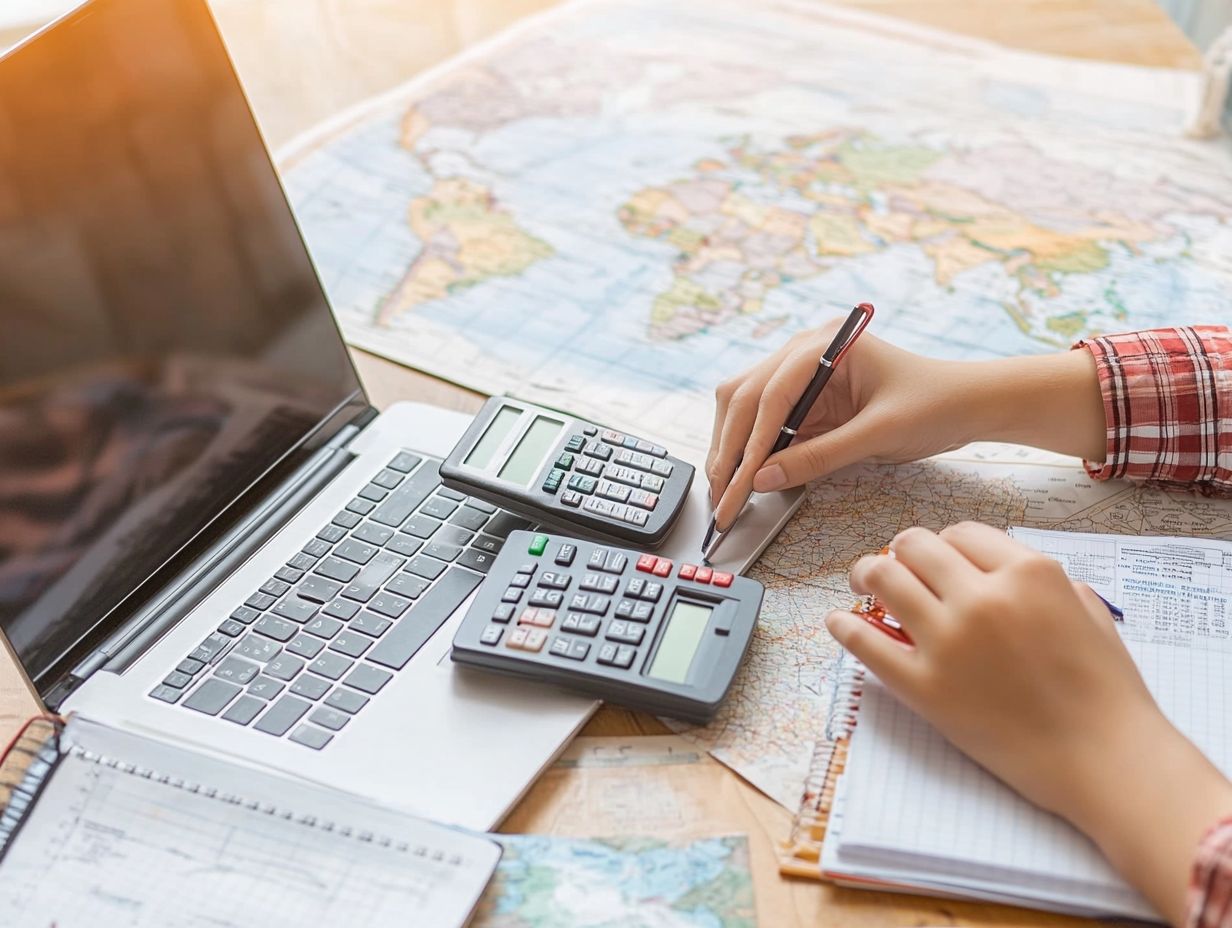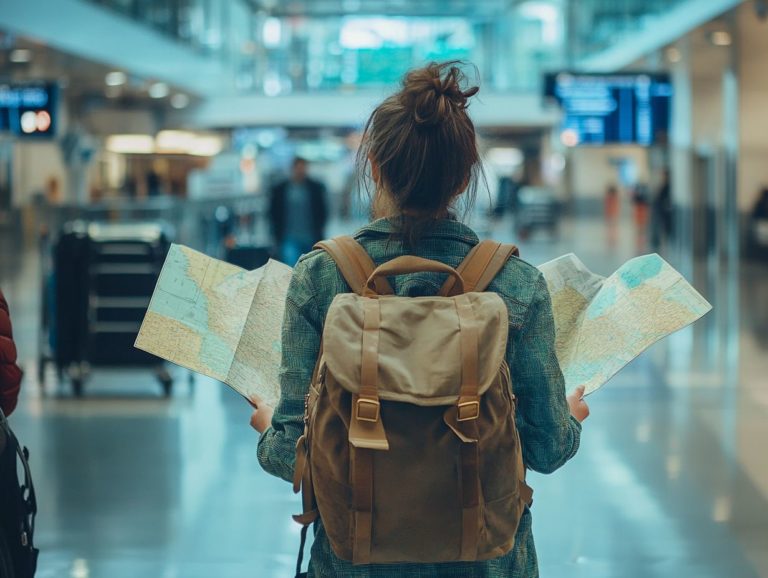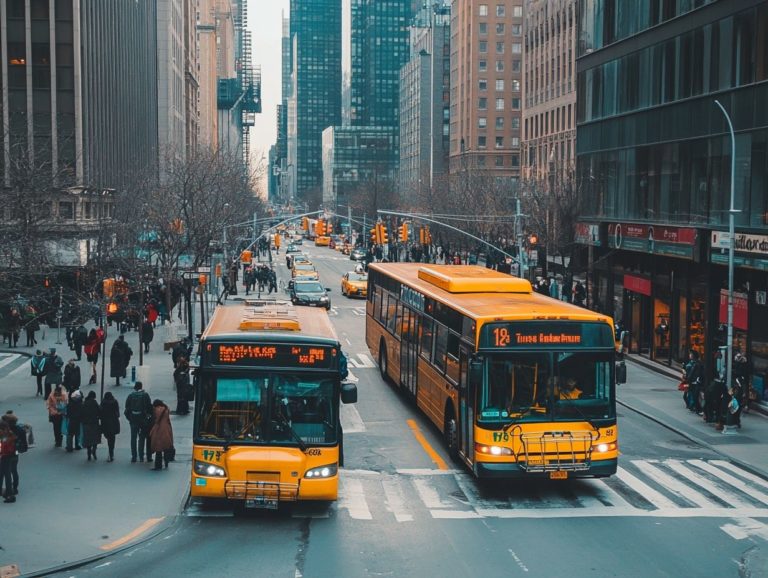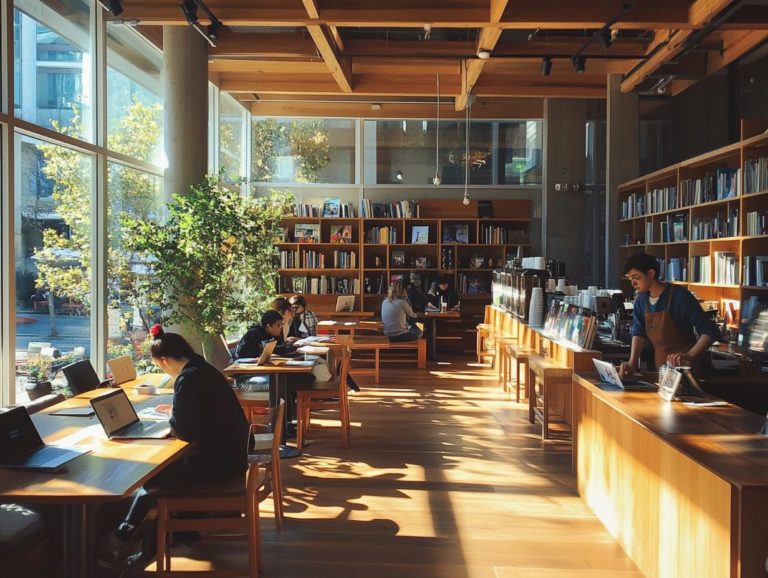Budgeting Tips for Students: Traveling on a Dime
Traveling as a student can be an exhilarating yet intimidating experience, particularly when it comes to managing your finances.
Grasping the significance of budget travel is essential for maximizing your adventures without emptying your wallet. This guide will help you take charge of your travel plans and empower you to craft a realistic travel budget, pinpoint must-have expenses, and reveal clever strategies to save money as you journey through the world.
From transportation hacks to scoring affordable accommodations and indulging in local cuisine, you ll discover how to make your travel funds stretch even further.
Dive in and uncover ways to fully embrace your adventures without compromising on enjoyment!
Contents
- Key Takeaways:
- Why Budget Travel is Important for Students
- Creating a Travel Budget
- Ways to Save Money on Travel
- Maximizing Your Travel Experience on a Budget
- Frequently Asked Questions
- What are some budgeting tips for students traveling on a dime?
- How can I save money on transportation while traveling on a budget?
- What are some ways to save on places to stay while traveling as a student?
- How can I save money on food while traveling as a student?
- What should I do if I go over my budget while traveling as a student?
- Is it possible to travel on a dime as a student?
Key Takeaways:

- Set a realistic budget for your travels by considering essential expenses such as transportation, accommodation, and food.
- Save money on travel by utilizing transportation hacks, opting for budget-friendly accommodation options, and being strategic with food and activity choices.
- Maximize your travel experience on a budget by seeking out free or inexpensive activities, trying local cuisine, and traveling during off-seasons for better deals.
Why Budget Travel is Important for Students
Budget travel is vital for you as a student, enabling you to explore diverse destinations and immerse yourself in various cultures without putting your finances at risk. To make your journeys even more impactful, consider these tips for sustainable travel as a student. With education costs and living expenses continually on the rise, many students seek affordable travel options.
By planning wisely and using smart money-saving tips, you can turn your travel dreams into reality while staying on track with your financial goals. To ensure a smooth journey, learn how to avoid common travel mistakes as a student. This approach not only allows you to experience local cultures and activities but also equips you with skills that will serve you well in your future career.
Embracing budget travel opens the door to invaluable experiences and unforgettable adventures.
Creating a Travel Budget
Creating a travel budget is essential to ensure that your travel dreams don t spiral into unexpected financial burdens. To plan your trip effectively, consider various factors such as accommodation, transportation, meal planning, and travel insurance.
A well-structured travel budget not only clarifies your potential expenses but also acts as a safety net for unforeseen costs that might pop up along the way. By systematically outlining these expenses, you can fully immerse yourself in your travel experiences, free from the worry of overspending.
Setting a Realistic Budget
Setting a realistic budget is essential for you to fully enjoy your travels while staying within your financial means. This allows you to save for future expenses as well. Begin by assessing your income, existing savings, and the total cost of your intended trip, including all potential expenses like budget flights and accommodation.
A practical first step is to create a comprehensive list of all expected costs, ranging from transportation and lodging to meals and entertainment. You might also consider establishing a separate travel fund, where you can set aside a percentage of your income each month.
To score cheap flights, using comparison websites, remaining flexible with your travel dates, and signing up for notifications that let you know when flight prices drop can lead to significant savings. Periodically reviewing and adjusting your budget based on changing circumstances ensures that you strike the right balance between enjoying your adventures and staying on top of your financial responsibilities.
Ready to explore the world without breaking the bank? Start planning your budget travel adventures right away!
Identifying Essential Expenses
Identifying essential expenses is key to creating a travel budget. This helps you allocate funds wisely and avoid overspending.
Consider expenses like places to stay, transportation, meal costs, and the importance of travel insurance for peace of mind.
By evaluating these costs, you can prioritize spending. This ensures your decisions fit within your overall budget.
Understanding these essential expenses assists you in planning and ensures a smoother travel experience.
To estimate these expenses, categorize them into groups. Take advantage of online resources like apps that help you manage your spending or travel forums.
Explore various accommodation platforms to find budget-friendly options that might otherwise slip under your radar.
Evaluating transportation choices from public transit to rideshare services allows you to pinpoint the most economical routes.
Investigate local dining options and plan meals around budget-friendly eateries to avoid unexpected costs.
Incorporating travel insurance into your budget is crucial. It protects you from unforeseen circumstances that could derail your trip.
A detailed dive into these elements gives you the power to craft a realistic and enjoyable travel itinerary.
Ways to Save Money on Travel

Saving money on travel is crucial for students, allowing you to explore new places without financial stress. Consider traveling off the beaten path for unique experiences that won’t break the bank!
By embracing smart budgeting and strategic planning, you can unlock significant savings on key travel components, including transportation and accommodation.
Use tools like Google Flights and Skyscanner to find cheap flights. Consider options like Airbnb or Couchsurfing for your stay.
Immerse yourself in local experiences to enrich your journey while keeping costs low. This ensures that every adventure is both memorable and wallet-friendly.
Transportation Hacks
Transportation hacks can significantly cut your travel costs. They allow you to navigate your destinations efficiently while sticking to your budget.
Relying on public transport is often one of the most economical choices. Cities worldwide boast extensive transit systems that link you to various attractions at a fraction of the price of taxis or rental cars.
Leverage apps and websites to find cheap flights when booking trips. This maximizes your travel budget while enabling you to explore local experiences that truly enrich your journey.
Investing in city transport passes allows for unlimited travel, saving money on individual fares. This makes it easier to hop on and off at various points of interest.
Download transit apps tailored to your location for real-time updates on train and bus schedules. This makes navigation a breeze.
In terms of air travel, planning ahead can lead to substantial savings. Searching for flights during off-peak times and comparing prices using flight aggregator websites often yields the best deals.
Public transport also opens the door to off-the-beaten-path locations that are frequently overlooked. These offer richer cultural experiences that can elevate any trip.
Accommodation Options
Exploring various accommodation options is crucial for you as a student looking to save money while traveling. It can significantly affect your overall budget. From budget hotels to platforms like Airbnb and Couchsurfing, you can discover affordable stays that align with your financial constraints and offer unique experiences.
These options allow you to interact with locals and enjoy a more authentic travel adventure. By carefully selecting your accommodation, you can optimize your savings and fully embrace your travel experiences.
Today s travel landscape offers many budget-friendly options, enabling you to tailor your stay to your personal preferences. While hotels provide comfort and amenities, their rates can strain your finances. Hostels create a friendly environment with shared spaces, making them perfect for meeting fellow travelers.
Airbnb accommodations range from entire homes to shared rooms, providing diverse choices at various price points. Couchsurfing is a way to save money while immersing yourself in local culture, although it may require some flexibility on your part.
Evaluating these choices based on affordability, location, and the experiences you seek is essential to finding the best fit for your travel needs.
Food and Activities
Meal planning is an essential strategy for budget travel. It enables you to savor local cuisine while keeping your food expenses in check. By researching affordable dining options and embracing local markets or street food, you can enjoy authentic flavors without breaking the bank.
Allocating a specific budget for meals and planning them in advance allows you to enjoy your travels while still achieving your savings goals. This approach enriches your travel experience and fosters a deeper appreciation for local culture through food exploration.
To truly enhance your adventures, consider the benefits of shared accommodations, which often come with kitchen facilities. This gives you the opportunity to whip up simple meals using fresh, local ingredients, combining convenience with creativity.
Don t overlook the power of apps or websites that spotlight budget eateries; they can lead you to hidden gems beloved by locals. By cooking occasionally and balancing that with dining out at vibrant food stalls, you can stretch your budget while indulging in various culinary experiences. Prioritizing balance in your meal choices ensures that you relish the local fare while staying aligned with your financial plans.
Maximizing Your Travel Experience on a Budget
Maximizing your travel experience on a budget requires creativity and a proactive approach to uncovering unique opportunities that elevate your adventure without denting your finances.
As a student, you have the chance to fully embrace free or low-cost local activities. Look into seasonal travel options and community events that align with your itinerary. Immersing yourself in local experiences can lead to unforgettable adventures and meaningful cultural connections, transforming budget travel into something not just attainable but truly enriching.
Stay resourceful and discover exciting new places while keeping your financial goals intact.
Tips for Finding Free or Cheap Activities

Look for free or cheap activities. They can enrich your travel experiences without stressing your budget.
Many destinations boast a wealth of free or low-cost options. From vibrant local festivals to engaging community events, there s something for every visitor.
Researching seasonal travel opportunities helps you plan around local happenings. This way, you can immerse yourself in unique cultural experiences while keeping your finances in check.
These activities not only save you money but also create memorable interactions with locals and fellow travelers.
To uncover hidden gems, use online resources like Eventbrite and Meetup. They frequently list budget-friendly events.
Local tourism boards can be invaluable as well. They offer insights into activities that come at little or no cost, perfect for the smart traveler.
Social media platforms, particularly Instagram and Facebook groups, provide windows into local happenings and first-hand tips from residents.
Exploring different neighborhoods on foot doesn t just lead you to hidden cafes or striking street art. It fosters meaningful connections with the community, allowing you to truly experience the essence of the places you visit.
Making the Most of Local Cuisine
Making the most of local cuisine is a delightful way to immerse yourself in a destination’s culture while keeping your travel budget in check.
Seek out affordable meals at local eateries or markets. You can savor real local flavors that truly reflect the region’s unique heritage.
Meal planning becomes a crucial ally. It allows you to allocate funds for trying a variety of dishes while ensuring you don t overspend.
Engaging with local cuisine offers not just nourishment but also a deeper understanding of the culture and community.
Exploring these culinary delights opens up opportunities for genuine connections with locals! This often leads to memorable interactions.
To keep your dining experiences budget-friendly, consider breakfast options at street stalls or local cafes. They frequently serve traditional dishes at a fraction of the cost.
Packing a few snacks or stopping by a grocery store for fresh ingredients helps strike the perfect balance between dining out and preparing your own meals.
All these efforts not only help sustain your budget but also enrich your travel journey, filling it with unforgettable tastes and stories shared over a meal.
Traveling Off-Season
Traveling off-season can truly transform your experience. It s an excellent way to stretch your budget while exploring popular destinations without the crowds.
By opting for less busy times, you can uncover affordable flights and accommodation options. This can significantly trim your overall travel expenses.
This approach enriches your journey and allows more authentic interactions with locals. Enjoy attractions without the frustrating wait times!
Venturing out during off-peak seasons means escaping the tourist frenzy. This leads to a more personal and leisurely exploration of your chosen locales.
Figuring out when to travel isn t as daunting as it seems. Just check school holiday calendars and research destination-specific high seasons.
For instance, visiting iconic cities like Paris or Rome in late fall or early spring can yield remarkable savings on accommodations.
Think about destinations that shine off-season, like beach towns in early fall or ski resorts in late spring. You can still enjoy pleasant weather without the usual throngs of visitors.
Frequently Asked Questions
What are some budgeting tips for students traveling on a dime?
1. Create a travel budget before your trip: Determine your total budget and allocate specific amounts for transportation, places to stay, food, and activities.
2. Use student discounts: Take advantage of discounts offered to students for transportation, attractions, and places to stay.
3. Plan your meals: Eating out can be expensive. Consider packing your own meals or buying groceries to save money!
4. Consider alternative places to stay: Instead of staying in a hotel, look into options like hostels, couch surfing, or Airbnb to save on accommodation costs.
5. Research free activities: Look for free or low-cost activities to do at your destination, such as walking tours, visiting local parks, or exploring museums with free admission days.
6. Set a daily spending limit: To avoid overspending, give yourself a daily limit and stick to it by keeping track of your expenses throughout the day.
How can I save money on transportation while traveling on a budget?

1. Book in advance: By booking your transportation tickets early, you can often find better deals and save money.
2. Use public transportation: Instead of taxis or ride-sharing services, opt for public transportation to get around your destination.
3. Walk or bike: If possible, explore your destination on foot or rent a bike to save on transportation costs.
4. Look for student discounts: Many transportation companies offer discounted rates for students, so research and compare prices.
5. Consider group or multi-day passes: If you plan on using public transportation frequently, consider purchasing a group or multi-day pass for additional savings.
6. Avoid peak travel times: Traveling during off-peak times can often save you money on transportation costs.
What are some ways to save on places to stay while traveling as a student?
1. Stay in budget-friendly options: Look for affordable choices like hostels, budget hotels, or rental properties.
2. Share places to stay with friends: If traveling with friends, consider sharing a room or splitting the cost of a rental property.
3. Use loyalty programs: If you frequently travel, sign up for loyalty programs offered by hotels or rental companies to earn points and save on future trips.
4. Look for deals and discounts: Keep an eye out for promotional codes or last-minute deals on places to stay.
5. Consider alternative options: Look into camping, homestays, or house-sitting to save on accommodation costs.
6. Negotiate prices: If staying in a hostel or budget hotel, try negotiating for a lower price, especially for extended stays.
How can I save money on food while traveling as a student?
1. Avoid eating out: Eating out can quickly add up! Pack your own meals or buy groceries to prepare meals in your accommodation.
2. Research affordable dining options: Look for budget-friendly restaurants or street food options to try local cuisine without breaking the bank.
3. Pack your own snacks: Bring snacks from home to avoid buying expensive snacks while traveling.
4. Take advantage of free breakfast: If your accommodation offers free breakfast, use it to save money on at least one meal per day.
5. If you have a kitchen, use it to cook meals and cut dining costs! Cooking your own meals can save you a lot of money.
6. Want to save even more? Consider sharing meals with friends to save money and try a variety of dishes!
What should I do if I go over my budget while traveling as a student?
1. Re-evaluate your budget: If your budget is no longer realistic, make necessary adjustments to avoid overspending.
2. Cut back on expenses: Look for areas to reduce costs, such as transportation, activities, or dining out.
3. Find ways to earn extra money: Consider taking up a part-time job or freelance work while traveling to cover expenses.
4. Use emergency funds: If you have an emergency fund, consider using it as a last resort for unexpected expenses.
5. Look for alternative, budget-friendly options: Consider alternatives for places to stay, transportation, or activities to save money.
6. Learn from your mistakes: Use the experience as a learning opportunity and make adjustments for future trips to avoid going over budget again.
Is it possible to travel on a dime as a student?
Yes, it is possible to travel on a dime as a student with good planning and keeping an eye on costs. You can find valuable tips for traveling with limited funds, utilize student discounts, and research affordable options.
Being flexible with your travel plans can help you create unforgettable memories without breaking the bank!




